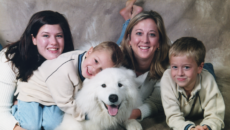In the classic children’s story, The Mulberry Bird, the travails of “Mother Bird” are set forth in touching detail: her struggle to feed her baby bird; the storm that drives her to seek counsel from the wise Owl; her visit to the “seashore birds,” who ultimately welcome the baby bird into their soft, safe nest.
But one figure is all but missing from this poignant tale: Father Bird. The male who fathered baby bird is mentioned only in passing. Mother Bird “noticed that some of the other mothers had father birds to help them. Her baby’s father had flown away long before she built her nest and laid the pale blue egg.”
So it goes in the world of adoption, where a child’s biological father is often relegated to a minor role or pushed offstage altogether. A birth mother making an adoptive placement may fail to name the baby’s birth father or even inform him of her plans. Adoptive parents may regard their child’s birth father with fear or suspicion.
“In most adoption cases, everybody wants him [the birth father] out of there,” says Mary Martin Mason, the Minneapolis-based author of Out of the Shadows: Birthfathers’ Stories, one of the few books that tackles the subject of birth fathers. “He’s a legal problem. The birth father and the birth mother may no longer be a couple. What happens is, he often exits, and everybody’s glad he’s exiting.”
An invisible birth father, however, is no cause for celebration. Indeed, his exclusion can have dramatic legal and emotional consequences. In practical terms, adoptive parents who conveniently forget the birth father subject themselves to serious legal risk.
It’s no coincidence that in the two most celebrated contested adoptions in the United States — the cases of Baby Jessica and Baby Richard — each involved a birth father who learned only after the fact that his child had been placed for adoption, and who went to court to claim custody. Any responsible adoption lawyer will emphasize the birth father’s role during his very first interview with adoptive parents, says Washington, D.C., adoption attorney Mark McDermott. “I refer to that as the number one way to avoid contested adoptions, by treating the birth father as a real issue on day one,” he says. McDermott noted that many birth mothers simply assume that things will be easier if he remains unnamed. The birth mother may not even be aware that the birth father has legal rights. She also may have personal reasons for counting him out.
No social worker, lawyer, or adoptive parent can force a birth mother to name the birth father if she is determined to keep him anonymous. But adoptive parents have the option of declining to work with a birth mother who is unable, or unwilling, to name the child’s birth father. For a couple longing for a baby, passing up a chance at parenthood may seem too much to ask. But the alternative — a post-placement revocation — is far worse.
Just ask Andrew and Barbara Ship, a Rockville, Maryland, couple whose first son, Aaron, was removed from their home after one month when his birth father returned to claim custody. Andrew and Barbara had attended, and wept at, the baby’s birth in Pennsylvania. They had brought him home to his nursery and conducted a “bris,” the Jewish circumcision ceremony, with 100 relatives and friends in attendance.
Yet when Aaron’s biological father surfaced to say that he wanted the child back, a Pennsylvania adoption attorney informed the Ships that they had little legal standing. The agency that had arranged the placement had misled them: Aaron’s birth father had never relinquished his parental rights.
The Ships later adopted a daughter, Hannah, now four years old. But they approached this second adoption, arranged through a Florida agency, with a different attitude. “We knew what the rights of refusal were, we knew what the [interstate] compact laws were,” Andrew said. Most importantly, when Hannah’s birth father proved slow to sign the consent, Andrew personally tracked him down.
“I spoke to him on the phone,” Andrew said. “I just said: ‘Look, what’s the story here? We want to adopt this lovely little girl and make her our daughter…Do you agree?’” The answer was yes, and Andrew and his wife regard Hannah as “a gift from God,” the child that was meant to be theirs.
Some birth fathers contest an adoption, McDermott noted, not because they actually want to parent the child, but because they are angry at being treated as if they didn’t exist. “Birth fathers will rarely object to the adoption if you involve them and show them a little bit of respect,” he said. “The easiest way of forcing them into a contested adoption is by not respecting them, or by trying to exclude them.”
Even when there are no legal complications, a birth father’s disappearance can incur high emotional costs. For children who lack information about their biological parents, finding a birth father can be frustrating. A child tends first to search for her birth mother, who may be the only person who knows the birth father’s identity. When Baltimore resident Sue Luecke-Schnuck started searching for her biological parents 14 years ago, at age 18, she was stymied by sealed adoption records. Now 32, Luecke-Schnuck has made considerable progress: she’s established contact with her biological mother, and thanks to open records laws, she’s obtained a variety of agency and public documents, including her birth certificate.
There’s just one problem: her biological mother has refused to discuss the birth father with her. She sent Luecke-Schnuck a letter that in essence said “There is nothing to tell.” Luecke-Schnuck’s reaction was: “What do you mean, there’s nothing more to tell? This is my biological father. This is half of my physical being.”
Birth fathers, too, pay a price for staying in the shadows. Mason says that the birth fathers interviewed for her book “were incredibly sad to have lost their children.” They were also plagued by remorse.
“They were incredibly guilty,” according to Mason. “This had affected their adult lives — their marriages, their jobs, their relationships. They weren’t able to move on.”
One problem that birth fathers face is that everyone around them assumes that they don’t care. In fact, they may think about their biological children all the time.
“Very often, not only society at large but the birth mother herself thinks he’s not going to care, or it’s not something that’s going to be very important to him. And I think, very often, it is very important to him,” says Mary Weidenborner, of Spence-Chapin, a Manhattan-based adoption agency.
To be sure, some birth fathers do fail to take responsibility — a failure shared, perhaps, by societal institutions that undervalue marriage, families, and children. But professionals in the field of adoption, which tends to be dominated by women, acknowledge that they have failed to reach out sufficiently to birth fathers.
“I think we have to become more birth father friendly,” says Weidenborner. She cites the need to recruit more male social workers, invite birth fathers to conferences, and tailor more literature to biological fathers. It can take a lot of courage, Weidenborner noted, for a birth father to walk through the doors of an adoption agency. But, she adds, “I think there’s much less guilt or shame when the birth father feels that he came in with his eyes wide open and was able to make a plan that he thinks was good for the child.”


